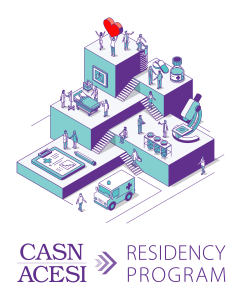home » Programs » Residency Program
 From advanced beginner to competent registered nurse (RN) – CASN’s national residency program for RNs integrates nursing graduates into health care delivery, creating a more sustainable workforce.
From advanced beginner to competent registered nurse (RN) – CASN’s national residency program for RNs integrates nursing graduates into health care delivery, creating a more sustainable workforce.
CASN’s Nurse Residency Program is the first of its kind offered in Canada. The research component will provide valuable evidence on the effectiveness of nurse residency programs in easing the transition of newly licensed registered nurses into their professional roles.
A residency program for RNs integrates competent, emotionally resilient, and retainable nursing graduates into a sustainable workforce.
Learn more about the research component from Dr. Judy Duchscher in this short video:
The 6-month Competency-Based Residency Program begins with a 5-day orientation provided by the health care institution, followed by a full preceptorship of the new graduate over an 11-week period. For the last 3 months of the program, the preceptor-mentor provides as-needed information and support to the new graduate while they acclimatize to a full workload. During the six months, CASN provides virtual workshops to the new graduates.
There is also a required asynchronous, virtual Preceptor-Mentor Training Program for staff nurses over a 3-month period before the program starts. This course may be taken during non-working hours.
Costs for the Program (Curriculum, Workshops, Preceptor-Mentor Training, and Competency-based Evaluation Rubrics): starts at $10,000 annually, plus $200 per preceptor-mentor course attendee.
*This does not cover the preceptor-mentor release time costs. There is no cost to nursing graduates. See Program Partners for more details.

Interested Government |

Interested Health Institution |

Interested Preceptor |
| Reduce nursing shortages by supporting a national competency-based residency program for new RNs | Grow a retainable nursing workforce through a partnership with CASN to deliver the residency program | Build nursing capacity and competence by developing skills through the CASN preceptor-mentor training program |
| Government role
Assisting health care institutions with funding for the residency program. |
Health Institution role
Providing a new grad orientation to the institution and assigning the preceptor/mentor. |
Preceptor role
Teaching, supervising, coaching, mentoring, and supporting the new grad as they progressively take on a full patient assignment. |
Program documents:
For information about the program, contact CASN’s Don Flaming at dflaming@casn.ca.
Health institution employers can use this form to apply to participate in the CASN Residency Program or to request more information.

